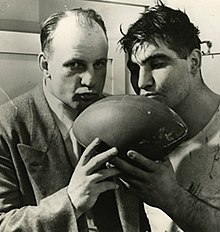 Voigts and Northwestern center Alex Sarkisian kiss the game ball after winning the Rose Bowl in 1949. | |
| Biographical details | |
|---|---|
| Born | March 29, 1916 Evanston, Illinois, U.S. |
| Died | December 7, 2000 (aged 84) Wilmette, Illinois, U.S. |
| Playing career | |
| Football | |
| 1936–1938 | Northwestern |
| Basketball | |
| 1936–1939 | Northwestern |
| Position(s) | Tackle (football) |
| Coaching career (HC unless noted) | |
| Football | |
| 1939–1940 | Illinois Wesleyan (assistant) |
| 1941 | Yale (line) |
| 1942–1943 | Great Lakes (assistant) |
| 1946 | Cleveland Browns (assistant) |
| 1947–1954 | Northwestern |
| Basketball | |
| 1939–1941 | Illinois Wesleyan |
| Baseball | |
| 1940 | Illinois Wesleyan |
| Head coaching record | |
| Overall | 33–39–1 (football) 25–16 (basketball) |
| Bowls | 1–0 |
| Accomplishments and honors | |
| Awards | |
| |
Werner Robert Voigts (March 29, 1916 – December 7, 2000) was an American football and basketball player and coach. He served as the head football coach at Northwestern University from 1947 to 1954, compiling a record of 33–39–1. Voigts led the 1948 Northwestern Wildcats team to the Rose Bowl, the first in school history, where they defeated California, 20–14.
Voigts was a native of Evanston, Illinois, where Northwestern's main campus is located. He attended Northwestern and played on the school's football team between 1936 and 1938. In his sophomore year, the Wildcats won the Big Ten Conference, and Voigts was named an All-American tackle. After college, Voigts served as an assistant football coach and head basketball coach at Illinois Wesleyan University before moving briefly to Yale University, where he was a football line coach. He entered the U.S. Navy during World War II in 1942 and was stationed outside of Chicago where he met Paul Brown, the head coach of the base's football team. When Brown became head coach of the Cleveland Browns after the war, he hired Voigts as a tackle coach. After a year with the Browns, Voigts became head coach at Northwestern.
Voigts resigned as Northwestern's head coach in 1955, citing growing criticism of his coaching after a string of losing seasons. He left football but stayed in Evanston, where he ran a real estate business for 30 years. He died in 2000.